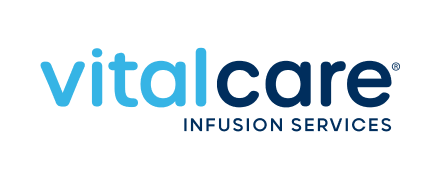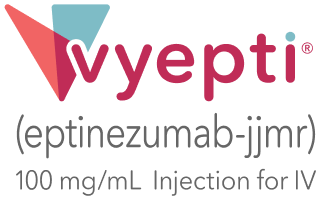VYEPTI has flexible infusion options based on whether you refer patients to an infusion site or infuse in-office
VYEPTI Infusion Network
Lundbeck partners with a network of infusion providers to deliver a consistent VYEPTI treatment experience in a convenient location for your patients.
With the VYEPTI Infusion Network, your patients can expect*:
Patients can also expect a welcome phone call from the infusion provider, which may come from an unrecognized number. Please remind patients to be aware of this upcoming call.*
Referral forms for our provider partners
Find a VYEPTI Infusion Network location, or other infusion site, near your patients.
VYEPTI administration is not limited to the VYEPTI Infusion Network; Lundbeck does not recommend use of any specific infusion provider.
*Other infusion providers may also have these offerings.
†For eligible patients with commercial insurance.
Infusing in-office
Buy-and-bill and specialty pharmacy options are available for acquiring VYEPTI. See below for details.
VYEPTI national drug code
| 100 mg/mL Solution in Single-Dose Vial | |
|---|---|
10-Digit format 67386-130-51 |
11-Digit format for claims submissions 67386-0130-51 |
HCPCS J-CODE
| Specialty distributors included in VYEPTI’s network | |
|---|---|
![]() Complete a benefits investigation Verify your patient’s benefits and submit a prior authorization, if needed. (VYEPTI CONNECT can help confirm coverage.)
Complete a benefits investigation Verify your patient’s benefits and submit a prior authorization, if needed. (VYEPTI CONNECT can help confirm coverage.)
![]() Complete a benefits investigation
Complete a benefits investigation
![]() Order VYEPTI and arrange shipment The specialty distributor will ship VYEPTI to your office, typically within 1 business day.
Order VYEPTI and arrange shipment The specialty distributor will ship VYEPTI to your office, typically within 1 business day.
![]() Order VYEPTI and arrange shipment
Order VYEPTI and arrange shipment
![]() Submit a claim for reimbursement Collect your patient’s out-of-pocket portion of the cost and submit a claim to the payer for reimbursement of medication and administration fees.
Submit a claim for reimbursement Collect your patient’s out-of-pocket portion of the cost and submit a claim to the payer for reimbursement of medication and administration fees.
![]() Submit a claim for reimbursement
Submit a claim for reimbursement
Specialty pharmacies included in VYEPTI’s network
Select the pharmacy name to download their prescription form.
P: 800-259-7145 |
|
P: 855-244-2555 |
Lundbeck does not recommend the use of any particular specialty pharmacy or specialty distributor.
To avoid delays, it is important for your office and patients to communicate with the specialty pharmacy.
![]() Submit a prescription & supporting documentation Fax a completed referral form, a copy of the insurance card (front and back), and any relevant chart notes—including medication history. The specialty pharmacy will conduct a benefits investigation and communicate any prior authorization requirements.
Submit a prescription & supporting documentation Fax a completed referral form, a copy of the insurance card (front and back), and any relevant chart notes—including medication history. The specialty pharmacy will conduct a benefits investigation and communicate any prior authorization requirements.
![]() Submit a prescription & supporting documentation
Submit a prescription & supporting documentation
![]() Specialty pharmacy arranges shipment After purchasing VYEPTI, the specialty pharmacy will coordinate shipment details based on the infusion schedule with your office. NOTE: Patients will be contacted directly for permission to ship VYEPTI. Remind them to answer calls promptly.
Specialty pharmacy arranges shipment After purchasing VYEPTI, the specialty pharmacy will coordinate shipment details based on the infusion schedule with your office. NOTE: Patients will be contacted directly for permission to ship VYEPTI. Remind them to answer calls promptly.
![]() Specialty pharmacy arranges shipment
Specialty pharmacy arranges shipment
![]() Submit a claim for reimbursement The Infusion Provider collects your patient’s out-of-pocket portion of the administration cost. The specialty pharmacy will bill the payer for VYEPTI.
Submit a claim for reimbursement The Infusion Provider collects your patient’s out-of-pocket portion of the administration cost. The specialty pharmacy will bill the payer for VYEPTI.
![]() Submit a claim for reimbursement
Submit a claim for reimbursement
Referring out
The VYEPTI Infusion Network as well as additional sites of infusion are available. Home infusion may also be an option, depending on your patient’s insurance coverage. See below for more details.
Lundbeck partners with a network of infusion providers to deliver a consistent VYEPTI treatment experience in a convenient location for your patients.
The VYEPTI Infusion Network can*:
![]() Give new patients helpful VYEPTI information
Give new patients helpful VYEPTI information
![]() Help patients understand access
Help patients understand access
![]() Keep your patients and your office informed
Keep your patients and your office informed
![]() Please tell your patients to expect*:
Please tell your patients to expect*:
Download the referral form for each of our partner providers
| Infusion for Health† |
| IVX Health† |
| Option Care Health |
| Paragon Healthcare |
| Soleo Health |
| TwelveStone Health Partners |
| Vital Care |
| Vivo Infusion† |
*Other infusion providers may also have these offerings.
†Provider consists of outpatient infusion sites only. Home infusion may be available through our other network partners.
Lundbeck does not recommend the use of any specific infusion site.
Some insurers may require VYEPTI to be infused in certain sites of care or by specific in-network infusion providers.
For general questions about the VYEPTI Infusion Network, contact your Biopharmaceutical Account Manager.
Help avoid delays when referring patients to a provider in the VYEPTI Infusion Network
Follow these 3 steps:
- Ensure the referral form is completed with all the required information
- Include a copy of the patient’s insurance card (front and back)
- Attach chart notes, including medication history that satisfies the patient’s insurance requirements
NOTE: Patients can also expect a welcome phone call from the infusion provider, which may come from an unrecognized number. Please remind patients to be aware of this upcoming call.
Use the VYEPTI Infusion Locator to find a location near your patients.
While these locations are outside the optional VYEPTI Infusion Network, they may be in-network with your patient's insurance provider.
Use the VYEPTI Infusion Locator to find a location near your patients.
![]() Other specialty infusion providers, hospital-owned outpatient centers/clinics
Other specialty infusion providers, hospital-owned outpatient centers/clinics
![]() VYEPTI home infusion
VYEPTI home infusion
Help avoid delays for your patients and office
Follow these 3 steps:
- Ensure the referral form is completed with all the required information
- Include a copy of the patient’s insurance card (front and back)
- Attach chart notes, including medication history that satisfies the patient’s insurance requirements
NOTE: Patients can also expect a phone call from the infusion provider, which may come from an unrecognized number. Please remind patients to be aware of this upcoming call.
Use the VYEPTI Infusion Locator to find a location near your patients.
Expert office managers and a migraine specialist discuss helping patients along their treatment journey
Select any chapter within the video player to view that content.
Chapter 1: Introduction to VYEPTI®
Chapter 2: In-Office IV Infusion
Chapter 3: Referring Patients Out
Chapter 4: Panel Discussion
Download these resources and get the process started today.
Ready to get your patients started? You can enroll them online here. They can also learn more about the copay program and enroll themselves by visiting vyeptisavings.com or calling 833-4-VYEPTI.
VYEPTI CONNECT is only available for eligible patients who have been prescribed VYEPTI and who are enrolled in VYEPTI CONNECT; support may vary based on patient eligibility. See full Terms and Conditions.
Terms and Conditions: Informational Support provided through VYEPTI CONNECT (“Informational Support”) is available for eligible VYEPTI® (eptinezumab-jjmr) patients only. Informational Support should not replace conversations between patients and their healthcare providers or their office staff, is not insurance or a guarantee of coverage or assistance, and has no independent value. Patients are eligible for Informational Support if they have a valid prescription for VYEPTI and a request is submitted to VYEPTI CONNECT using a completed VYEPTI CONNECT Enrollment Form. Informational Support includes insurance coverage information related to VYEPTI and, depending on patient eligibility, information regarding other Lundbeck patient support programs. Separate applications may be required for Lundbeck programs to determine patient eligibility, and other terms and conditions may apply for such programs. There may be other ways for patients to obtain assistance in verifying insurance coverage for, and/or affording the cost of, VYEPTI. Questions regarding other possible sources of patient support should be directed to the patient’s healthcare provider.
Lundbeck cannot guarantee payment of any claim. Coverage and reimbursement may vary significantly by payer, plan, patient, and setting of care. Actual coverage and reimbursement decisions are made by individual payers following the receipt of claims. It is the sole responsibility of the provider to ensure the accuracy of all claims used in seeking reimbursement.
There is no purchase requirement associated with Informational Support. Informational Support is only provided in the United States where allowed by law. Informational Support is intended to comply with all applicable laws and regulations, including without limitation the federal Anti-Kickback Statute, the regulation of its implementation, and related guidance interpreting the federal Anti-Kickback Statute. Lundbeck reserves the right to rescind, revoke, or amend Informational Support without notice. Questions regarding Informational Support that may be available to patients and opt-out requests should be directed to VYEPTI CONNECT at 833-4-VYEPTI, Monday through Friday, 8 AM–8 PM (ET).
Terms and Conditions for the VYEPTI CONNECTTM Copay Assistance Program (the “Program”)
Terms and Conditions: Commercially insured patients aged 17 years and older whose insurance policy provides coverage for VYEPTI® (eptinezumab-jjmr) (or the “Product”) and whose insurance company does not pay for the entire cost of their prescription, may be eligible to receive financial assistance with out-of-pocket expenses for VYEPTI medication costs and VYEPTI administration costs (the “Offer”). Patients are not eligible for the Offer:
(1) If they are self-pay, meaning the patient pays the entire cost of the prescription out of their own pocket; or
(2) If the patient is enrolled in a health plan that is funded, in whole or in part, by the federal or state government; examples of such government health plans are Medicare or Medicaid, Medigap, VA, DOD, or TRICARE; or
(3) If they are Medicare-eligible and enrolled in an employer-sponsored retiree health plan or prescription drug benefit program.
Eligible patients may pay as little as $0 per infusion of VYEPTI. This Offer is subject to a Program assistance cap of $200 per infusion for eligible administration costs, and a calendar year maximum on all Program assistance for all out-of-pocket expenses for VYEPTI (i.e., medication and administration expenses) (the “Cap”). If the patient’s total out-of-pocket expenses for VYEPTI exceed the Cap established by Lundbeck, the patient will be responsible for the additional balance. Patients should confirm their out-of-pocket cost with their pharmacy, or with their healthcare provider (“HCP”), prior to treatment. Copay claims must be submitted to the Program within 180 days of the patient’s date of service.
The Offer is valid for use only with a valid prescription for VYEPTI (up to 300 mg) for an approved indication at the time the prescription is filled by the pharmacist, or at the time the HCP administers VYEPTI to the patient. The Offer applies only to prescriptions filled before the Program expires or terminates. The Offer applies to the patient’s out-of-pocket costs for the Product and the eligible out-of-pocket Product administration costs. Any other fees related to the Product administration are the responsibility of the patient. The patient or patient’s HCP shall not submit any prescription or administration copays for payment to any public third-party payer, including Medicaid or Medicare, or to any other similar federal or state healthcare program. Patients are responsible for complying with any obligations or requirements imposed by their commercial insurance plans.
Copay assistance for Product administration costs is restricted in Massachusetts, Minnesota, and Rhode Island. Claims submitted on behalf of, or requested to be paid to, patients or providers located in RI are not eligible for copay assistance for Product administration costs. Claims submitted by, or requested to be paid to, providers located in MA or MN are not eligible for copay assistance for Product administration costs.
The Offer is intended solely for the eligible patient’s benefit and is not transferable to any other person. The selling, purchasing, trading, or counterfeiting of the Offer is prohibited by law. The Offer has no cash value and may not be used in combination with any other discount, coupon, rebate, free trial, or similar offer for the specified VYEPTI prescription (including any pharmacy benefit manager or insurer program that adjusts patients’ out-of-pocket costs for their drugs, such as through “maximizers” or “accumulators”).
Lundbeck reserves the right to rescind, revoke, terminate, or amend the Offer at any time without notice. The Offer is intended to comply with all applicable laws and regulations including, without limitation, the federal Anti-Kickback Statute, its implementing regulations, and related guidance interpreting the federal Anti-Kickback Statute. The Offer is not health insurance. The Offer is valid only in the USA and Puerto Rico where allowed by law. This Offer is not conditioned on any past, present, or future Product purchase requirement, including refills. Patients can discontinue participation in the Program at any time and their questions and requests can be directed to 833-4-VYEPTI (833-489-3784) Monday through Friday, 8 AM - 8 PM (ET).
The Offer will automatically renew each calendar year. If the patient no longer wishes to participate in the Offer, they can call and cancel at any time. By participating in the VYEPTI CONNECT Copay Assistance Program, the patient acknowledges and agrees that they are eligible to participate pursuant to the rules stated in these VYEPTI CONNECT Copay Assistance Program Terms and Conditions and that they understand and agree to comply with these VYEPTI CONNECT Copay Assistance Program Terms and Conditions.
































